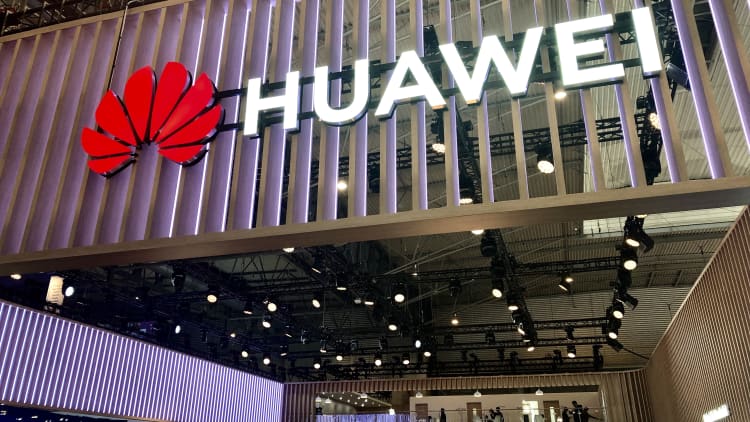China has plenty of ways it can retaliate against the U.S. treatment of Huawei, and U.S. companies could feel the brunt of it.
Both the White House and Commerce Department Wednesday took actions against the Chinese telecom company, which would essentially ban it from selling technology in the U.S. market and also stop it from buying the Qualcomm chips it needs for its production. Huawei was put on the Commerce Department's Entity List which would require companies to apply for a license to sell technology to Huawei, thus limiting its access to U.S. technology.
The U.S. may see the action against Huawei as a lever in its China trade negotiations, which have hit a rough spot and now could take several more months. China's possible reactions range from encouraging boycotts of U.S. products, favoring other companies over American companies, and conducting nuisance regulatory enforcements and inspections.

China could also use the same tactics it might use if trade talks become more difficult or fall apart, such as limiting purchases of U.S. Treasurys or selling them or weakening its currency. The biggest holder of U.S. Treasurys, China recently reduced its holdings to the lowest level in two years.
Eurasia Group analysts said there's only now a 15% chance of a deal by the time President Donald Trump and Chinese President Xi Jinping meet at the G-20 meeting at the end of June. They see a 45% chance that negotiations will be extended, and 40% chance there will be no deal or truce.
Citigroup economists still expect a trade deal within the next couple of months, regardless of where Huawei stands. "This is consistent with our view that the tensions between the U.S. and China go beyond trade. What we thought before this event was these issues regarding the technology sector were mostly taken on a different path, so they're not that tied to having a trade deal," said Cesar Rojas, global economist at Citigroup.
Analysts speculated that one of China's first responses to the Huawei actions was to formally charge two Canadians Thursday with espionage. The two were arrested in December, and the charges against them were viewed as payback for Canada's help in the arrest of Huawei CFO Meng Wanzhou, who is fighting extradition to the U.S.
'Mobilizing patriotic consumers'
In January, the U.S. charged Huawei and Meng with wire fraud, obstructing justice, conspiring to launder money and violating the International Emergency Economic Powers Act by doing business with sanctioned Iran. Meng is the daughter of Hauwei's founder and faces extradition to the U.S. Washington has also discouraged the adoption of Huawei technology in other countries, for fear its equipment is not secure and could be used for cyber-espionage.
"There has been some signaling about maybe mobilizing patriotic consumers, so you could maybe see a boycott of U.S. products. That's been pretty limited so far. That's been the main response," said Adam Segal, director of digital and cybersecurity at the Council on Foreign Relations.
He said Apple would be the most likely target because its products are sold directly to consumers, but China may not want to rev up consumers too much. "There is a worry that if you mobilize too much nationalist sentiment, that you can't control it," he said.
Segal said China could use anti-competition inspections on China-based operations of U.S. companies, as it did with Microsoft several years ago. "They could search your factory. At 5 o'clock in the morning, inspectors show up and demand to see your books," he said.

China would likely move toward developing its own sources for chips. "It will reinforce the sentiment of the Chinese leadership that they have to double down on their own investment, longer-term investing in AI, 5G and all the other technologies that we're worried about," Segal said. 5G is essentially the next generation of mobile networking that should result in a faster internet and allow users to conduct whole new operations linking smartphones to more everyday tasks.
Analysts noted that Oracle is one company now moving operations from China. It is reported to be laying off 900 people at its research center in Beijing.
"Oracle has a toehold in China, and given the noise, that's a smart move for them to take a step away," said Dan Ives, managing director and technology analyst at Wedbush. He said Oracle can do business cheaper elsewhere because of the tariffs.
Ives said Apple is the company at most risk for retaliation, but China may not want to be too hard on Apple since it employs 1.4 million people there including at Foxconn. "But realistically, I think that could only impact 3 to 5% iPhone purchases in the country. That's what i would call a pretty contained issue for Apple."
Chip companies are even less at risk since they are not as vulnerable to consumer boycotts, he said. "There's limited strategic moves China can do because Qualcomm on 5G is so integral on the smart phones," said Ives.
"Qualcomm is as integral to the Chinese smartphone market as Tiger Woods is to golf. It's that intertwined. Micron and Skyworks are also key, especially Micron, but it also speaks to the semi food chain. China needs to handle that with kid gloves, if they went after it, it would have worse implications domestically that would far outweigh the benefits of retaliation..China knows that and that's why the U.S. knows when it comes to Huawei, that they know that 's a card they could play," Ives said.
The pain for Huawei will clearly be greater than for U.S. suppliers. "Our assessment is Huawei, just like all large tech companies, remains highly dependent on a global supply chain, and possibly will experience a notable disruption without a continuous supply from the US. For suppliers, losses of Huawei may be mitigated by the gain of Huawei's rivals, but short-term setbacks are hard to avoid," Bernstein analysts wrote. Analysts believe Huawei has been stockpiling chips, and that could help it for awhile.
Eurasia Group analysts said since Trump reversed a similar action against Huawei rival ZTE last year, it may be that Huawei is permitted to buy some U.S. technology.
"It is still not clear the extent which the administration is using this as a new weapon in its campaign against Huawei (our preliminary take) or a negotiating tactic in trade talks," the analysts wrote. They noted Huawei could be ultimately crippled and denied access to its hardware and software suppliers for moblie infrastructure and handsets.
"This would also quickly put at risk both the company itself and the networks of Huawei customers around the world, as the firm would be unable to upgrade software and conduct routine maintenance and hardware replacement. It would hit virtually all of Huawei's products, including high-end smart phones, mobile infrastructure, data centers and cloud services, and have immediate global implications for any company utilizing Huawei's products or services. European carriers, in particular, are likely to be affected quickly," the Eurasia Group analysts noted.
Stocks of Qualcomm and other Huawei suppliers, Skyworks and Micron were all moving sharply lower Thursday.


